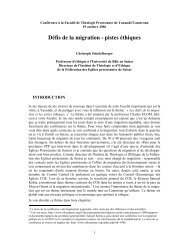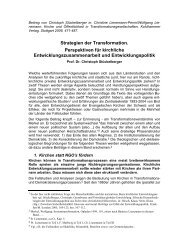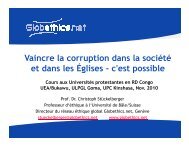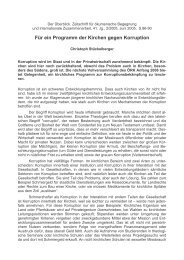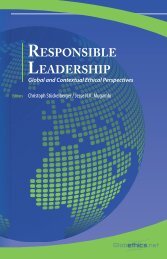BREAK THE CHAINS OF OPPRESION AND THE YOKE OF ...
BREAK THE CHAINS OF OPPRESION AND THE YOKE OF ...
BREAK THE CHAINS OF OPPRESION AND THE YOKE OF ...
Create successful ePaper yourself
Turn your PDF publications into a flip-book with our unique Google optimized e-Paper software.
FuturE All of these changes will have significant impacts upon all human populations<br />
and the wider ecosystem of the earth. The Stern Review notes that ‘the poorest<br />
developing countries will be hit earliest and hardest by climate change, even<br />
though they have contributed little to causing the problem’. 9<br />
In Africa, for example, agricultural production is projected to be severely compromised<br />
as early as 2020, and food production in other areas will be compromised.<br />
Progress toward achievement of the UN Millennium Development Goals<br />
is likely to be impeded and by the mid 21st century there are likely to be 200<br />
million refugees as a result of climate change. 10 For global warming as low as<br />
1.5°C, it is estimated that 30% of species face an increased risk of extinction,<br />
while for warming of 3.5°C, 40–70% of species may become extinct. 11<br />
While there was some legitimate debate during the early stages of the development<br />
of scientific models of climate change regarding their accuracy, there is<br />
now an overwhelming scientific consensus that the analysis provided in the<br />
IPCC report is robust and reliable. 12 Even in the most optimistic scenario identified<br />
in the report, where there is international action to bring rapid and significant<br />
cuts in greenhouse gas emissions, the associated rise in global temperatures<br />
of 2°C by the end of the 21st century will make many areas of human population<br />
uninhabitable and cause the extinction of many plant and animal species. It<br />
is important to note that while much progress has been made in understanding<br />
climate change, the scientific view continues to develop. Some new research released<br />
since publication of the IPCC report suggests climate change will occur<br />
even faster than the IPCC estimates. 13 Regardless of whether this is eventually<br />
accepted into the consensus scientific view, the conclusions of the current IPCC<br />
report are sufficiently robust to suggest that it is now morally irresponsible to fail<br />
to act on this analysis of our current situation.<br />
� � � � �<br />
9 Stern Review Report on The Economics of Climate Change (London: Cabinet Office<br />
– H. M. Treasury, 2005), www.hm-treasury.gov.uk/sternreview_index.htm, xxvi.<br />
10 IPCC, ‘Synthesis Report Summary’, 11, Table SPM-2, 18; N. Myers, ‘Environmental<br />
Refugees: An Emergent Security Issue’, Paper presented at the 13th Economic Forum,<br />
Prague, 23–27 May 2005, www.osce.org/documents/eea/2005/05/14488_en.pdf.<br />
11 IPCC, ‘Synthesis Report Summary’, 13–14.<br />
12 See the DEFRA position on climate change (http://www.defra.gov.uk/ENVIRON-<br />
MENT/ climatechange/index.htm); The United Nations Framework Commission on<br />
Climate Change (http://unfccc.int/2860.php); the United Nations Environment Programme<br />
Global Environment Outlook Report (www.unep.org/geo/geo4/media/);<br />
The Stern Review on the Economics of Climate Change (http://www.occ.gov.uk/ activities/<br />
stern.htm); and the Royal Society guide to climate change controversies<br />
(http://royal society.org/page.asp?id=6229).<br />
13 J. Hansen, et al., ‘Target Atmospheric CO2: Where Should Humanity Aim?’, The<br />
Open Atmospheric Science Journal, 2 (2008), 217-231, doi: 10.2174/187428230080<br />
2010217, www.bentham.org/open/toascj/openaccess2.htm.<br />
��������������������������������������������<br />
� � � � ��������������������<br />
�<br />
– HOPE IN GOD’S FUTURE – 151



